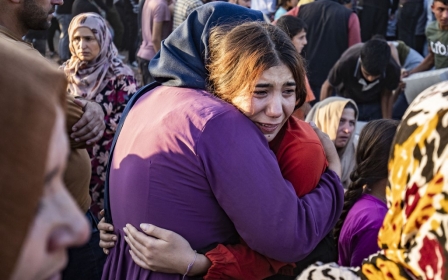British war monitor challenges UK refusal to provide details of civilian death in Syria

The UK is one of the "most transparent coalition members" in the details it provides about air strikes it has conducted in Syria and Iraq against the Islamic State (IS) militant group.
But it is "among the worst" in terms of publicly disclosing the consequences of those strikes, particularly whether civilians were harmed, the UK-based watchdog Airwars told a tribunal.
The tribunal, which opened on Wednesday in London, is focused on the one civilian that the UK government has officially admitted to harming during its eight-year campaign against IS.
In May 2018, the minister of defence told parliament about an incident which he said had happened two months earlier in eastern Syria.
During a UK air strike targeting three IS militants, a civilian on a motorbike "crossed into the strike area at the last moment" and was unintentionally killed, the minister said.
Stay informed with MEE's newsletters
Sign up to get the latest alerts, insights and analysis, starting with Turkey Unpacked
There were limits, he said, to what could be provided "given ongoing operations and consequent national security issues".
But using a Freedom of Information request, the civilian harm watchdog Airwars sought further information from the Ministry of Defence about the strike.
The ministry rejected the request, arguing that releasing the information could, among other impacts, threaten national security and harm international relations. The Information Commissioner's Office upheld the decision.
Airwars is now appealing, arguing that the UK will remain "far behind its allies" without greater transparency about how the government assesses civilian harm.
"In the US, we have a clear understanding of how that process goes," Joe Dyke, Airwar's head of investigations, told the tribunal.
"In the UK, we still have no understanding of what that looks like. That is why we are here in this particular case. It is one case and it is a snapshot, but we are using that one case to understand that civilian harm process."
The Ministry of Defence maintains that the information that Airwars wants is exempt from release for the reasons it found when it first responded to the organisation's request.
In particular, it argues that the utility of the Reaper drone, the weapon used in the 2018 incident, or similar capabilities, is reliant on adversaries' uncertainty about how the UK employs them.
Standard of proof?
In the eight years in which the UK has said it killed 4,000 IS militants and one civilian, the US has accepted responsibility for the deaths of more than 1,400 civilians, Airwars says.
Airwars' lawyer, Will Perry, asked Alexander Oliver, a senior civil servant at the Ministry of Defence, about the contrast of the figures and whether the perception that the UK's civilian harm procedures are not as reliable as its allies, concerned him.
"I don't know how many strikes the US conducted, nor do I have a huge amount of knowledge about their conduct of operations, so it doesn't concern me," Oliver said.
"I have confidence in the process the Ministry of Defence uses for the assessment of civilian harm."
Oliver also said that he did not know what the ministry's standard of proof was when assessing whether civilians had been killed in an air strike.
Following an open session on Wednesday morning, the tribunal went into a closed session without Airwars' lawyers for most of the afternoon and will continue on Thursday.
Middle East Eye delivers independent and unrivalled coverage and analysis of the Middle East, North Africa and beyond. To learn more about republishing this content and the associated fees, please fill out this form. More about MEE can be found here.





